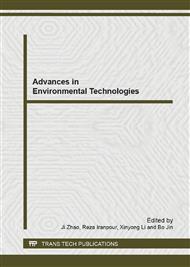[1]
Yaomin Zheng, Haiying Zhang, Zhenguo Niu, et al. The preliminary assessment on protection effectiveness of national wetland nature reserve in China. Science China Press Vol. 57(2012), p.207–230 (in Chinese).
Google Scholar
[2]
Information on http://www.znb.gov.cn
Google Scholar
[3]
Information on http://www.fmprc.gov.cn/ce/cede/chn/ssxw/t555865.htm
Google Scholar
[4]
Zhiyun Ouyang, Xiaoke Wang, Hong Miao, et al. Problems of management system of China. snature preservation zones and their solutions. Science and Technology Review Vol. 22(2002), p.49–56 (in Chinese).
Google Scholar
[5]
Jia Quan, Zhiyun Ou Yang, Weihua Xu, et al. Management Effectiveness of China Nature Reserves: Status quo Assessment and Countermeasures. Chinese Journal of Applied Ecology 20(2009), p.1739–1746(in Chinese).
Google Scholar
[6]
BA¨RBEL BLEHER, DANA USTER and THOMAS BERGSDORF. Assessment of threat status and management effectiveness in Kakamega Forest, Kenya. Biodiversity and Conservation Vol. 15(2006), p.1159–1177.
DOI: 10.1007/s10531-004-3509-3
Google Scholar
[7]
Ervin J. Protected area assessments in perspective. Bio-Science 53(2003), p.819–822.
Google Scholar
[8]
Margoluis R. and Salafsky N. 1998. Measures of Success: Designing, Managing, and Monitoring Conservation and Development projects. Island Press, Washington, DC.
Google Scholar
[9]
Chunfeng Zhang, Liucai Zhu, Ning Peng. EU Natura 2000: a model of nature reserves. Environmental Protection Vol. 6(2011), p.73–74(in Chinese).
Google Scholar
[10]
Salafsky N. and Margoluis R. Thread reduction assessment: a practical and cost-effective approach to evaluating conservation and development projects. Conserve. Biol. Vol. 13(1999), p.830–841.
DOI: 10.1046/j.1523-1739.1999.98183.x
Google Scholar
[11]
Dayuan Xue, Yinwen Zheng. Study on assessment index of nature reserves management in China. Journal of Rural Ecological Environment Vol. 10(1994), p.6–9(in Chinese).
Google Scholar
[12]
Zhihong Xie, Yongxin Xu. Management Effectiveness Evaluation of Nature Reserve in Hubei province. Hunan Forestry Science and Technology Vol. 30(2003), p.7–10(in Chinese).
Google Scholar
[13]
Lijun Jiang, Hong Miao, Ju Zhang, et al. Analysis on Assessment Index of Management Effectiveness of Nature Reserve. Journal of Rural Ecological Environment Vol. 21(2005), p.73–75(in Chinese).
Google Scholar
[14]
Shuanglin Wang, Xia Li, Yang Luo, et al. Nature Reserve Management evaluation methods - management effectiveness tracking tool of protected areas. Wildlife Vol. 2(2005), pp.23-25 (in Chinese).
Google Scholar
[15]
Yanjun Pang, Kaidi Liu, Bowen Zhang. The Method of Determining the Objective Index Weight in the Synthetic Evaluation System. Theory and practice of system engineering Vol. 21(2001), pp.61-65(in Chinese).
Google Scholar
[16]
Jinbao Su, Chunping Zhang, Long Tang, et al. Research on Eco- tour ism Product Development of Hui River National Nature Reserve Based on SWOT Analysis. FOREST ENGINEERING Vol.26(2010), 27-31(in Chinese).
Google Scholar


